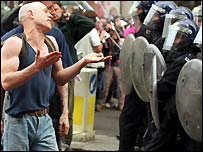Overthrow capitalism and replace it with something nicer
yeah | 01.05.2003 14:58

Overthrow capitalism and replace it with something nicer
One of the most memorable banners from the May Day protests is the one urging activists to "overthrow capitalism and replace it with something nicer".
But while the imprecision of the slogan amused many, it also highlighted an awkward dilemma for a movement that is often perceived to oppose everything and propose nothing.
"What's the alternative?" spectators to the demonstrations might have asked, "what do you want instead?"
According to anarchists, the answers can be found through the process of self-empowerment, or 'DIY culture'.
Protesters are attempting to build "a genuine grassroots counter-culture" with which to oppose what they see as the commodification of everyday life.
Social centres
One practical manifestation of this culture is the emergence around the UK of what their proponents call "social centres".
The common name for this practice is squatting. But activists insist they have little in common with the traditional stereotype of "dirty squatters".
Empty buildings are occupied and converted into "semi-autonomous communities," offering local residents public spaces and free or cheap services.
The Radical Dairy was one such example.
In January 2002, some 20 activists entered a disused building in Stoke Newington, north-east London.
Having been empty for four years, it soon boasted a café, provided English lessons for foreign speakers and DJ workshops for young people. The centre has now closed after being forced to move on by the building's owner. During the year it was up and running, its organisers said they were trying to offer services and activities to the community that were not available through traditional local authorities.
But although not explicitly political, social centres take on a political dimension by their refusal to operate within conventional social structures.
Police 'crackdown'
Activists involved in these kinds of projects regularly complain they have been subjected to disproportionate police attention.
One anarchist, who gives her name as June, says they felt police crack down on anything perceived as slightly radical or outside the normal boundaries of state control.
"Anything that genuinely empowers people will be opposed by the state," she says.
Anarchists, who instinctively distrust authority, reject the idea of working with local councils to achieve their aims of providing community services.
June says: "Local council help comes with clauses and paperwork. We don't actually need grants from them. It's much more empowering to do it completely independently".
She accuses councils of cutting vital social programmes and pushing through privatisation of provisions and services without the consent of the local people who use them.
"Local government is failing communities. All government is".
'Lost connection'
Rejecting political parties as bureaucratic and controlled by big business, June argues that social centres provide an effective way of influencing things directly.
"Parties have lost their connection with ordinary people and their communities," she says.
Only a genuinely grassroots movement can rebuild these ties.
As for the government, its only comment on social centres is to remind people that occupying another person's property is an offence.
But while it is illegal under British law to occupy land without the owner's consent, anarchists argue they are trying to convert some of the UK's 750,000 empty properties into useful community spaces.
'New politics'
Rather than being a new phenomenon, June believes that the development of social centres as focal points for communities has been ignored or misunderstood by the mainstream media.
Naomi Klein, author of the bestselling counter-culture bible No Logo, has described them as windows - "not only into another way to live, disengaged from the state, but also into a new politics of engagement."
If so, it is an engagement which undermines many existing ideas of political authority and property ownership.
Perhaps attempts to resolve the two are destined to fail... and so, as a May Day website notes, the "struggle" will continue.
yeah
Comments
Display the following comment